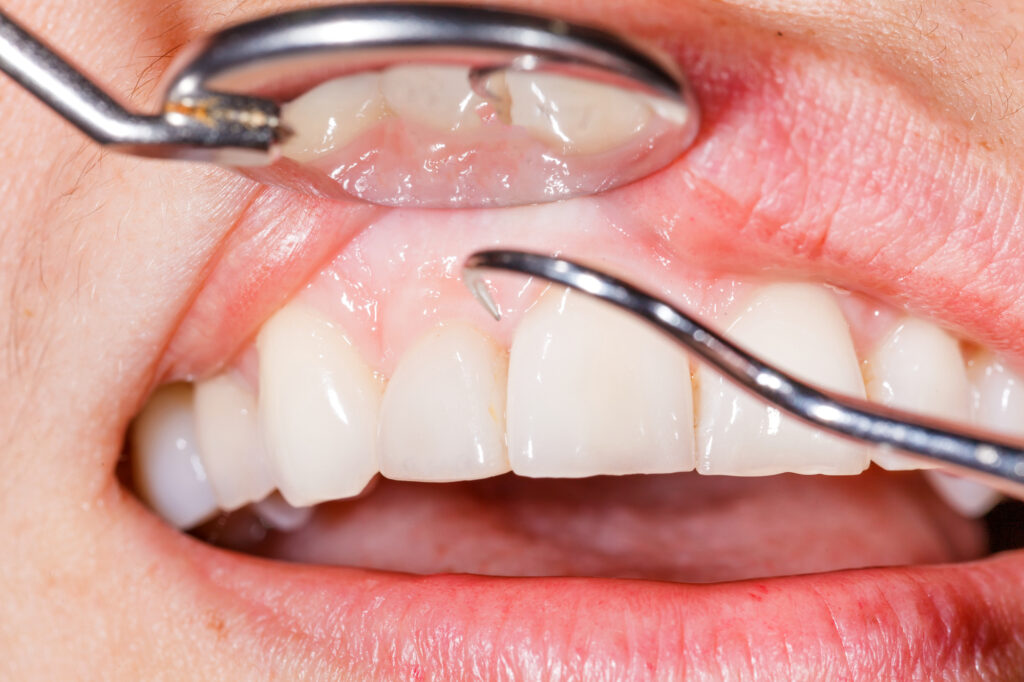
Periodontal disease–also known as gum disease–is one of the most common oral health conditions in America. In fact, the CDC estimates that almost half of adults over the age of 30 have some form of the condition. And, unfortunately, untreated periodontal disease can have disastrous effects on both your oral and overall health.
However, Dr. Helen Ragsdale of Austin Laser Dentist has all the tools and experience needed to diagnose and treat gum disease. Here, we’ll explain the four stages of periodontitis, and what you can do to reclaim your oral health.
The Progression of Gum Disease
Firstly, gum disease is categorized in two ways: gingivitis and periodontitis. Gingivitis is the very beginning of periodontal disease, and it is so mild that most patients can reverse the condition. However, if patients don’t seek treatment, then gingivitis will progress into more damaging and irreversible periodontitis.
Gingivitis
The human mouth is home to billions of bacteria. Some of that bacteria are good, and they help keep our mouths and bodies healthy. However, an overgrowth of bad bacteria and plaque buildup on the teeth can lead to swollen gums, or gingivitis.
Because gingivitis is mild and relatively painless, most patients will not notice the condition. Nevertheless, gums that are red, inflamed, or bleed during normal brushing and flossing are indicators of early periodontitis.
Stage 1 Periodontitis–Initial
Untreated gingivitis leads to chronic inflammation. Long-term inflammation causes the gum tissue to slowly pull away from the teeth, which exposes the tooth root. When this happens, bacteria can get below the gum line and infect both the tooth and gum tissue.
Stage 1 periodontitis cannot be reversed. However, the outlook for treating and managing the condition at this stage is positive.
Stage 2 Periodontitis–Mild
Stage 2 periodontitis symptoms are more noticeable than stage 1 symptoms. Patients at this stage will notice more gum inflammation, sensitivity, bleeding, and bad breath. The damage to the teeth and gums at this point is noticeable, but treating and managing the condition is still fairly promising.
Stage 3 Periodontitis–Moderate
Patients with stage 3 periodontitis will experience pain that begins to affect their daily lives. Other symptoms will include:
- Foul tasting and smelling breath
- Extreme gum recession
- Teeth that appear longer
- Moving or wiggly teeth
- Abscesses, or infections
- Damage to the jaw bone
Furthermore, treating and managing periodontal disease at this stage becomes more difficult, and tooth loss is an imminent threat.
Stage 4 Periodontitis–Severe
Patients who progress to this stage will likely have several missing teeth, and the remaining teeth are typically unhealthy. This is because the gum and bone tissue are too damaged to hold the teeth securely in place. Unfortunately, patients at this stage may need to remove the remaining teeth to save their oral and overall health.
How to Prevent, Treat, and Manage Gum Disease
Ultimately, proper daily brushing and flossing are the best defense against gingivitis and periodontal disease. However, there are other ways that Dr. Ragsdale can help patients fight periodontal disease, such as:
- Twice yearly dental cleanings
- Root planing and scaling, which removes plaque from above and below the gum line
- Laser gum surgery that clears away infections
- Eliminating bacteria in periodontal pockets with laser pocket decontamination
- Repairing damaged gum tissue with gum grafts
- Surgically regenerating gum and bone tissue with guided tissue regeneration
- Bone grafting to promote healthy jaw bone growth
Gentle Laser Dentistry in Austin, TX
Periodontal disease is a painful and irreversible condition that negatively impacts your health and life. But, early detection and treatment are key to preventing and managing the condition. So, don’t delay–schedule an appointment with Dr. Ragsdale today by calling (512) 346-4690 or booking online.
